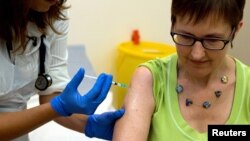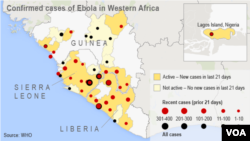At least 2,622 people have died in the worst outbreak of Ebola virus in history, which has so far infected at least 5,335 people in West Africa, the World Health Organization (WHO) said on Thursday.
The WHO said more than 700 more Ebola cases emerged in West Africa in one week, a statistic that shows the outbreak is accelerating. Just three weeks ago the number of new cases was around 500 for a one-week period.
The number of people believed to have killed is now more than 2,600, an increase of roughly 200 from the last estimate, WHO said Thursday. Most deaths have been in Liberia.
Just under half of the 5,300 cases of infection were recorded in the last three weeks, according to the WHO.
Officials said 318 health care workers have been sickened, and about half have died.
An Ebola education team in southeastern Guinea was found dead on Thursday, as the United Nations Security Council declared the virus a "threat to international peace and security."
Guinean officials said the group of seven local health workers and journalists had been killed "in cold blood" by villagers in the southeastern town of Wome after disappearing two days ago.
United Nations Security Council
The United Nations Security Council is holding an emergency meeting Thursday to discuss the spread of the Ebola virus.
U.N. Secretary-General Ban Ki-moon and WHO chief Dr. Margaret Chan will be outlining an international action plan to contain the threat.
The Council will also vote on a resolution, drafted by the United States, that calls on member states to quickly send aid, field hospitals and health workers to affected countries and lift travel restrictions to those areas.
The United States announced earlier this week that, at the request of Liberia, it would deploy 3,000 U.S. troops to West Africa to coordinate the medical and humanitarian response to Ebola.
The soldiers will be based in Monrovia and tasked with training medical workers, managing supplies and building new treatment facilities.
The WHO estimated earlier this week that it will need $1 billion to combat the deadly disease in the coming six months.
Meanwhile, a new World Bank analysis shows the Ebola epidemic could have a “catastrophic” economic impact on the most affected nations, costing more lives, billions of dollars and significantly cutting economic growth.
World Bank President Dr. Jim Yong Kim said the already serious impact on lives and commerce is made worse by fear of contagion that hampers trade, stops travel, and keeps people from going to work.
France to set up hospital
France will set up a military hospital in West Africa in the coming days as part of France's contribution to the fight against the Ebola outbreak there, President Francois Hollande said on Thursday.
Hollande said that France's response to the outbreak would not be limited to a financial contribution to European funds being made available to fight the virus.
“I have therefore taken the decision to set up a military hospital in the coming days in … the forests of Guinea, in the heart of the outbreak,” Hollande said during a news conference.
Also Thursday, Malta stopped a cargo vessel that was traveling from Guinea to Ukraine from entering its harbor for a medical emergency on Wednesday night on fears the sick person on board could be infected with Ebola, Prime Minister Joseph Muscat said.
Muscat said the vessel, the Hong Kong-registered Western Copenhagen, requested medical assistance but was refused entry after Maltese authorities realised the patient's symptoms were similar to the symptoms of Ebola.
The ship, with 21 persons on board, was now cruising close to Sicily and believed to be heading to Italy, he said. The armed forces were monitoring its whereabouts, he said.
“Our decision is morally and legally correct,” Muscat said.
Meanwhile, shoppers crowded streets and markets in Sierra Leone's capital on Thursday, stocking up for a three-day shutdown that authorities hope will slow the spread of the Ebola outbreak that is accelerating across West Africa.
Starting Thursday at midnight, Sierra Leone's 6 million people must stay home, except for thousands of volunteers who will go house to house delivering bars of soap and information about how to prevent Ebola.
Authorities have said they also expect to discover hundreds of new cases during the Friday, Saturday and Sunday exercise.
No signs of slowing
In an update on the epidemic, which is raging through Guinea, Sierra Leone and Liberia and has spread into Nigeria and Senegal, the WHO said there were no signs yet of it slowing.
“The upward epidemic trend continues in the three countries that have widespread and intense transmission - Guinea, Liberia, and Sierra Leone,” the United Nations health agency said.
It added that a surge in Ebola in Liberia is being driven primarily by a continued increase in the number of cases reported in the capital, Monrovia.
There are five known distinct strains of Ebola, and the outbreak raging in west Africa stems from the Zaire strain. That strain caused the world's first known Ebola outbreak in Democratic Republic of Congo in 1976, which until now was the deadliest on record, with 280 deaths.
According to the latest WHO numbers, as of September 14:
In Guinea, where the outbreak began at the start of the year, Ebola has killed 601 people, representing 64 percent of the 942 people infected.
In Liberia, which has been hit hardest by the outbreak, 1,459 have died, 54 percent of the 2,710 people infected.
In Sierra Leone, 562 people have died, 34 percent of the 1,673 people infected.
In Nigeria, eight people have died, 38 percent of the 21 people infected.
In Senegal, there's been only one confirmed Ebola case - a Guinean student who crossed the border just before it was closed on August 21 and has since recovered - but the country will not be declared transmission-free before 42 days have passed since the case was recorded.
Some material for this report came from Reuters, AP and AFP.






